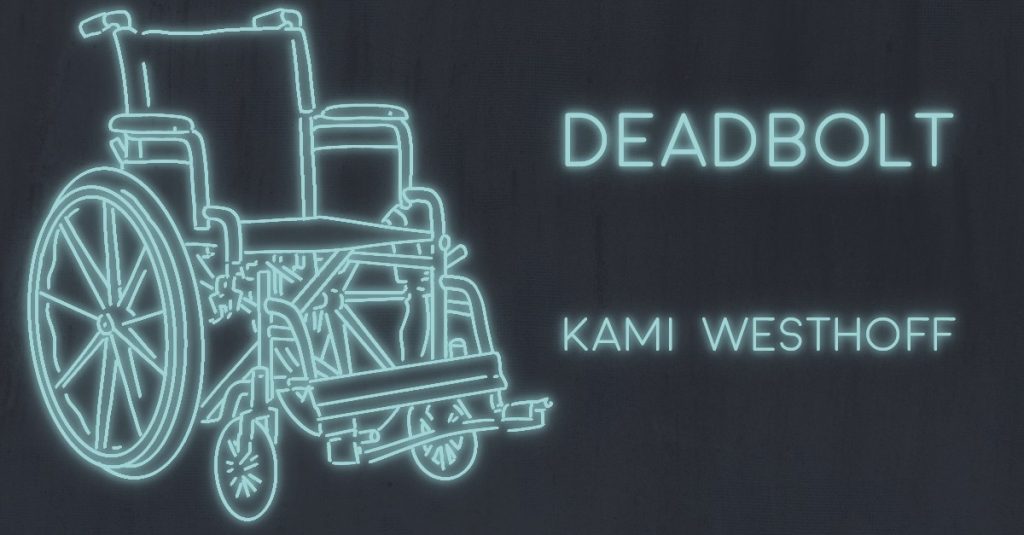In her dreams, she can walk. She unclips the cord that connects her to the Emergency switch, swings her bloated-log legs from the bed until her feet find her one-in-a-million prints in her purple slippers. Though it’s been over a year since she’s stood unassisted, her legs neither quake nor collapse. Her wheelchair sits next to her nightstand, a foam donut pillow the color of bile positioned just-right by her caregiver.
She thrusts her foot forward. It meets the earth as though it’s the ice she and her first husband carved into arcs and spirals, tufts of ice fluffing the pond’s surface. She shivers at the wind blowing from the north valley, her feet numbing through slippers. Her husband navigates the ice like a first language, bending to steady wind-milling children, scooping the fallen into his arms. Something clenches inside her when he lifts a fallen girl, and their plum-sized baby in utero flexes fingers into fists.
Her roommate’s bed has not been remade since she was relocated. She lifts the afghan, fluffs it until it lays flat on the bed. The wall above the dresser is decorated with photos of children, grandchildren, siblings, spouses, some might be her own, but she doesn’t stop to wonder. She’s had to make certain sacrifices to walk.
The hallway is an illuminated labyrinth. She smells a uric twinge, nothing like the tang of the cotton diapers of her daughter. It’s ranked by haloperidol, clozapine, memantine, valium. Her hands flutter and clench, roll and gather as she changes the soiled sheets from her daughter’s bed. The world was too much for her daughter, her body determined to starve her before her first birthday. The doctor once called her “tiny on the inside,” urethra too narrow, uterus too petite, wrists too delicate for the heavy-hold, ankles unsteady, even on friendly terrain. Her daughter had been trying to sky since birth, while her mother, heavy in all the wrong ways, was born to burrow.
A strip of light slashes the carpet’s taupe. The room it comes from belongs to “Dante Simpson.” The “D” drags her to Dad, who is only allowed one function in her memory: he must save her. She’d read that a parent saves their child’s life an average of forty-five times before the age of two. This saving is a last-second lift from the neighbor’s German Shepherd, Bode—her father tells her this story every time her fingertips navigate the zigzag scars on his calf. Her own scars are like fissures beneath the earth of subcutaneous tissue. The scar from her daughter intersects the one from the hysterectomy. Sometimes she wakes too early from the anesthesia, and the doctor behind the shocked-white barrier sheet, nothing but a strip of eyes between scrub mask and hat, says something that sounds like a prayer, and she’s back in the hallway.
Above her, higher than the second floor where people are in early stages, the third floor, where caregivers smoke and gulp coffee to get through weeks of doubles, is an August sky she hasn’t seen in two years. Stars spatter pinpricks of gas and dust people mistake for light, which is to say, for life. Sky is no longer sky for her. If she were to punch #3194# into the number pad at the front door, drift from the exhalation of the all-but-dead, the thrust of last words love ones carve into tongue, throat, gut to try and fail to translate later, beyond the streetlamps that pale the night, and if she were to look up, she’d see the storm of black and violet erupting on her cheek, her lip stitched with tiny black crosses, blackhole thumbprints twinned on her bone-bright throat.
Something somewhere cries: maybe a fussy hinge, or a northern mockingbird, and she lifts her newborn from its crib. The effort cricks her—the baby’s shoulders nearly split her into one only days earlier. Her breasts throb with the rush of milk that pricks like something barbed. And there is that fence on their property line that plucked tiny bulbs of raspberry blood on her back when she didn’t crouch deep. It’s hard to hold onto a baby sometimes, no matter how hard you try, and everything around you says let go. He’s there again, his voice a bomb in her kitchen, the baby a lit fuse against her chest. She believes him when he says he’s not fucking around, promises to forget it ever happened, what she thought she saw.
Laughter scatters across the hallway, but it’s trenched before she can ride its wave. It’s maybe what she misses most, laughter so expansive it cannot gather sound. Like a scream underwater, or into pillow, or in the woods past the barbed wire fence the night she thought he was too drunk to notice her slink from their bed, the baby’s grunt and whimper, the clunk of the backdoor deadbolt.
In this place, all hallways lead exactly where you started, though it always feels like the first time. Her room is as she left it—all at once her childhood bedroom, the room where he reminded her he could take anything he wanted whenever he wanted it, the room her second husband moved her bed into when he couldn’t stand the trench her body caused the mattress, the room where she pressed her mouth to her baby’s ear, voice a steady hot hush of Shhhh, palm a cradle beneath its moist diaper, the room where she lay, feet, pale and useless as fish in a fistfight, hands in a constant flurry of fuss, heart refusing to untether her body from the stubborn habit of beat.

